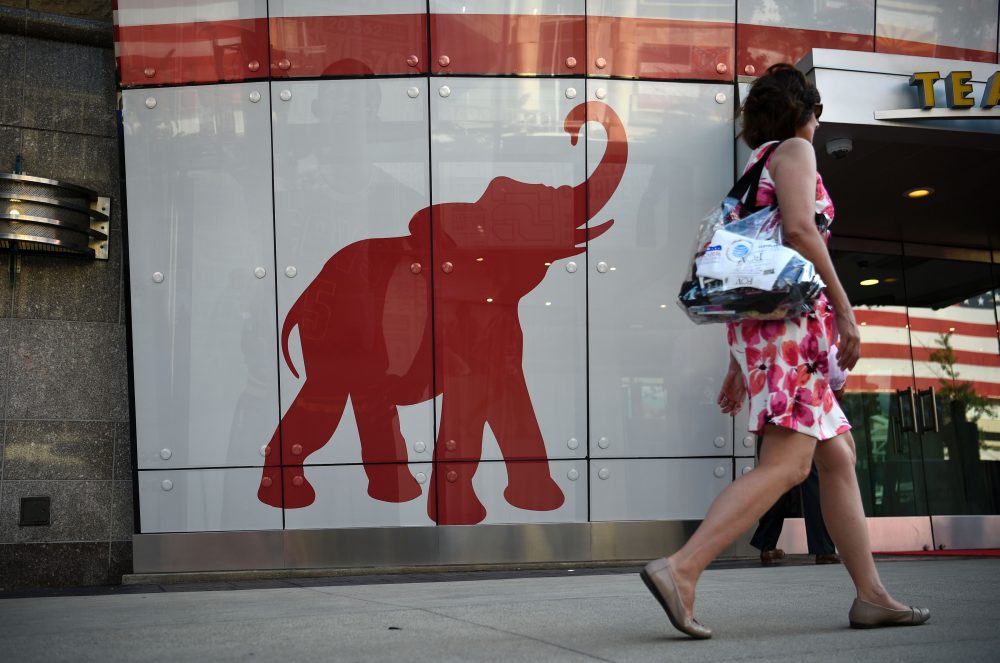Advertisement
Historian Of GOP Predicts Rank And File Will Take Back Party
Resume
Historian Heather Cox Richardson believes that Donald Trump's candidacy, after the release of the tape in which he talks about groping women, represents a moment in Republican Party history that has "been a long time coming."
Richardson joins Here & Now's Robin Young to discuss how she thinks more moderate voices will eventually emerge to lead the GOP.
Interview Highlights: Heather Cox Richardson
On how the 2005 tape of Donald Trump has impacted the party
"That tape represents a certain moment in the GOP, and it's been a long time coming. And what that does is it knocks a hole in the narrative that has managed to control the Republican Party since about the 1990s, but has been building since, actually, way back to the 1930s. And that was predicated on an image of a traditional family — a bread-winning man who could protect his wife and his children against the grasping immigrants, African Americans and women who wanted government handouts. Well that kind of language worked, until Donald Trump came out as a sexual predator.
...It shattered the beliefs among the people who've supported the Republican Party that their leaders had their best interests in mind. People who are voting Republican and who are voting to put people like the current Republican leaders in power are good people who believed that they were doing what was good for America and defending a traditional America. And what that moment did is it revealed that in fact what the leaders were doing was very different than what the rank and file were doing, and this is the moment when the rank and file takes their party back, but takes it back not necessarily in the thuggish way that the white nationalists would take it. But rather takes it back to an old fashioned, traditional Republicanism, which is what they believed in all along."
On traditional Republicanism
"Traditional Republicanism grew up in the 1850s as opposed to the Democrats, who always saw the world kind of as a 'us vs. them' proposition. That the world was limited; the economy was limited. And there was always a group of people who needed to stand against the elites to make sure that people at the bottom got enough. And that was the Democrats. The Republicans rose in the 1850s with a very different vision. That was a vision that the world was a social web, if you will — that if people of the bottom did well, got educations, worked hard, they'd produce more than they can consume and they would support a middle class, which would in turn support an upper class. And as the upper class did well, they would hire more people at the bottom."
On how the Republican Party has evolved and Movement conservatives
"...When [President Franklin Delano Roosevelt] and the Democrats — I know that's a big leap there — but when they went ahead and used the federal government to [create equality of opportunity], a group of extremists said, 'No, we should not have the government involved in any way in regulating the economy. And they should not be involved in any kind of social welfare, because government regulation will infringe on liberty and taxes will re-distribute from hardworking Americans,' generally white American men, 'and redistribute it through infrastructure, through schools, through hospitals into minority populations, largely black people. And we must stop those things.' And they called themselves movement conservatives — they're not traditional Republicans; they are Movement conservatives.
...When [Movement conservatives] took over the Republican Party and got rid of the traditional Rockefeller Republicans, if you will, Lincoln Republicans. When they read them out of the party, what they did is they wedded the party's machinery to this quite extremist idea that most Americans don't really believe. The moment we're in now, that movement conservative ideology has led to the Ted Cruzes and the Paul Ryans, yes, but what it's done is it created the demographic that feeds the white-nationalists — the hatred that most Americans don't really embrace."
On comparing this moment to similar moments in history
"Historians are prophets of the past, not of the future. But we again have been in this very moment before, and it was again in the 1880s and the early 1890s, when a group of Republicans committed to an ideology that looks much like movement conservatism said the same thing, 'If we don't win, the system is rigged. And the system is rigged by immigrants, by African Americans, by people who are un-American, and who should be purged from the society.' And from that, we got very traumatic riots and lynchings where regular people stormed courthouses, stormed governments, took over governments until in 1898 in Wilmington, North Carolina, of course, we get the very famous Wilmington riot, when the legitimate government was thrown out of office and replaced by a group of people who simply said, 'We don't care that it was legitimately elected. Those people who legitimately elected it should not be American voters.'"
Guest
Heather Cox Richardson, professor of history at Boston College and author of the book "To Make Men Free: A History of the Republican Party." She tweets @HC_Richardson.
This article was originally published on October 14, 2016.
This segment aired on October 14, 2016.